Tool boxes: varieties and recommendations for selection
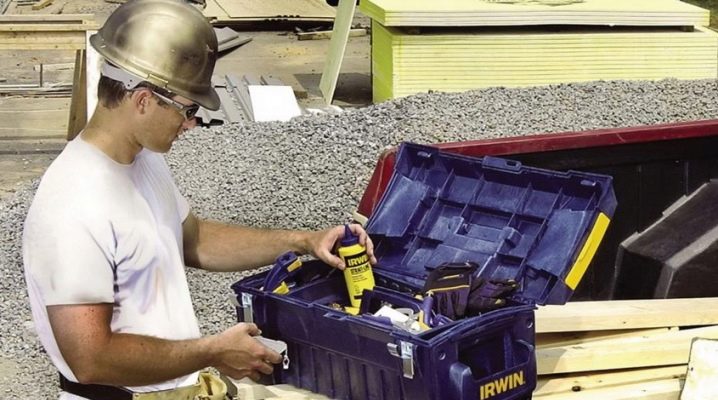
Over the years, lovers of tinkering accumulate a large number of tools and construction details. If they are organized and stored in boxes, it will not be difficult to quickly find the necessary item. Unlike a work cabinet, boxes with contents can be moved anywhere, so they perform two functions at once: storage and delivery.

Requirements
The boxes for construction and other tools have their own specific requirements, they should be taken into account when choosing a product.
- The bottom of the structure must be sufficiently stable and durable, he will have to support the heavy weight of the tools. Pay attention to the adhesive seams between the bottom and the walls.
- Reinforced wall stiffness is requiredto prevent the box from changing shape when fully loaded.
- Closing, unfolding and locking system should work clearly, effortlessly.
- Each material has separate requirements: wood is treated with antifungal and refractory impregnation. The metal is galvanized or painted. Only extremely durable types of plastic are used, which do not crack upon impact.
- The product must have a sufficient number of sections.
- Quality drawer contains no gaps, closes tightly.
- The design must withstand various temperature fluctuations, this is especially true for plastic, since you have to work with the tool in different conditions.

Views
It is quite difficult to classify tool boxes. Many companies are engaged in their release, due to which you can find a large and varied range of these products on the market. They are divided by design, material, purpose, size, type of opening and by the system of locks. Boxes are professional and household, open and closed, with or without wheels.

Access options
Access to the box can be open when it does not have a lid, or closed (with a lid, with a lock). The first type includes trays and other structures without a top. They have convenient quick access, but they are difficult to carry, dust collects on the instrument, and the contents are easy to spill. Most boxes are closed in various ways, have a reliable locking system, tools do not fall apart when dropped. The connection of the box with the lid occurs without gaps and gaps, which protects the contents from dust.
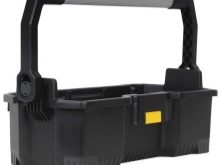


According to their design features, the boxes are divided into boxes, cases, organizers, etc. Let's take a closer look at each of the types.
- Boxes... Closed boxes made of plastic, wood or metal. They have a different number of branches. The covers can be opened in different ways: they can be folded back, moved apart, removed completely. Depending on the volume, wheels and the presence of handles, boxes are mobile, portable and stationary. The structures are spacious, most often equipped with locks.

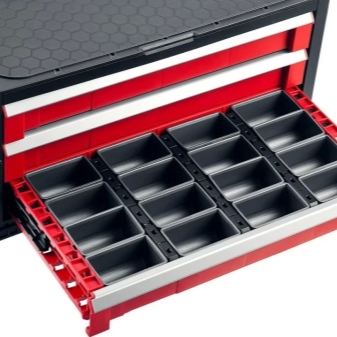
- Cases... They are miniature suitcases, divided into sections inside. They have a small carrying handle. Despite its compactness, one case can contain a large number of oversized tools.


- Organizers... Small drawer with many compartments for small fasteners. It can be horizontally laid out, when the sections with hardware are in the same plane, and vertical, made in the form of a mini-chest of drawers with drawers.

- Trays... Open container without lid.The tools in it are all in sight, but problems can arise during movement. Trays do not always have handles, and if they do, they are weak and can fail when the container is overloaded with tools.

- Containers... Rectangular boxes can be divided and not divided into sections, often contain removable modules. The covers are arranged in different ways: they can be removed, opened, moved apart. Large structures are equipped with wheels. Folding multifunctional transformer containers can contain a large number of items, while folded they seem compact.


Modular storage systems
They can be of two types:
- boxconsisting of removable modules;
- group of boxes of different volumes, sometimes combined by a modular trolley.


Most often they are produced from plastic. Small items are stored in modular boxes, and groups of large boxes contain an impressive amount of versatile tools.
- Multiboxes... These designs are similar to drawers with drawers. They are distinguished by their compactness and carrying handle. Multiboxes can have three or more rows. The containers themselves are not always the same size, they store bolts, nuts, screws.


- Chest of drawers. They differ from multiboxes in their large size and lack of portability. These are stationary boxes with drawers. They are usually used in the workshop for storing tools.
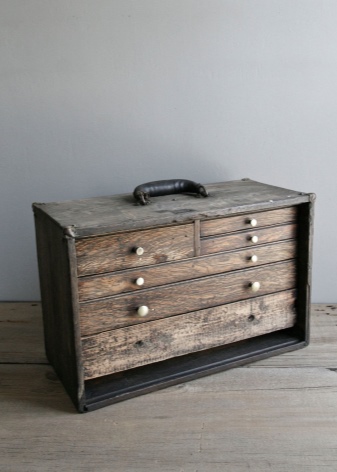

- Chest boxes. Chests are deep roomy products for stationary storage, most often they are done by hand. The interior can contain removable containers or fixed section dividers. Sometimes they are made with a drawer for small items.


- Suitcase boxes. The name speaks for itself - the product is very similar to a suitcase, but opening it, you can get a whole storage system. The photo shows an aluminum model with 5 compartments. In terms of volume, suitcases are smaller than chests, but larger than cases, they have good capacity and are endowed with handles for transportation.


- Maxi boxes. The largest boxes are professional equipment. They are equipped with two large wheels or four small ones. Most often they look like volumetric vertical boxes or removable modular structures. Boxes contain more than just large instruments. They are endowed with versatile sections for items of different sizes.

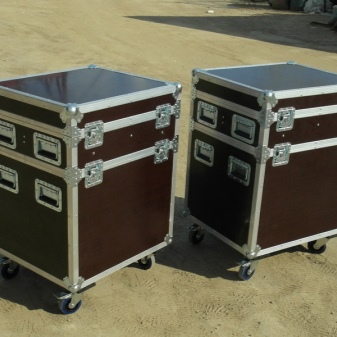
Products on wheels
Wheels are necessary for the convenience of transporting large boxes with heavy tools. They are of different types.
- Tall vertical typesetting drawer with two wheels, it has pull-out sections, capable of accommodating all types of tools, from large to small.
- Modular drawer group, equipped with wheels and a handle for moving.
- Tool trolleys belong to professional equipment, they are convenient to use in large industrial premises. The photo shows metal models from Yato and Force with 7 drawers for different types of tools. They are equipped with two pairs of small, stable, sturdy castors.
- Smaller trolleys can be used in domestic conditions: in home workshops, garages, in summer cottages. As an example, consider a Hazet model with two pairs of large and small wheels. When folded, the product looks compact. Folds out vertically to form four sections with good accessibility.
- Some large trolleys have full countertopson which you can lay out tools during work.

For professional equipment
They are more expensive than household ones and often come with the equipment itself. When buying, you should take into account the purpose of such boxes: locksmith, carpentry, construction. There are universal designs, with sections provided for many types of tools. In the photos you can see the boxes equipped with tool kits for different professions:
- locksmith's set;

- carpenter's set;

- carpenter's set;

- electrician's set;

- builder's set;

- universal.

Car bins are designed for storing car inventory. They are installed under the frame, in the body and in other suitable places. Most often, such products are made of metal and can withstand a weight of 10 to 40 kg. In the photo you can see examples of such structures.
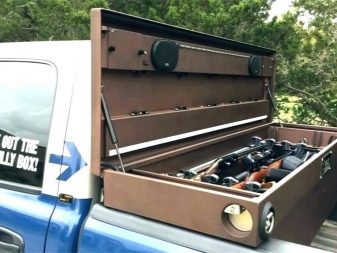
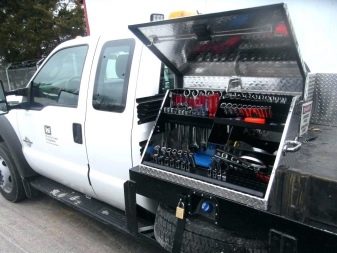
Materials and sizes
For tool boxes, wood, plywood, metal, plastic, galvanized metal-plastic are used. Boxes are also made on a fabric basis, but according to the structure of the material, they are better classified as bags.

Wood
Before the advent of plastic in our life, tool boxes were made of wood and metal. Wood is an environmentally friendly pliable material; craftsmen use it to assemble a box with their own hands. The product is made from inexpensive hardwood or pine. This material does not react well to moisture and can deteriorate over time if stored in damp locations. Therefore, before making a box, it is treated with special solutions, and then painted or varnished.

Wooden tool boxes are reliable and durable, they are lighter than metal ones, but noticeably heavier than plastic ones.
They are most often used for hand locksmith, carpentry, joinery tools. As for hardware, it is better for them to get into such boxes packed in small closed containers.
Average product dimensions are usually 12 "by 19". If the length of the box exceeds 50 cm, then together with the tool it will represent a rather heavy burden. At the same time, the width of less than 30 centimeters will not allow filling it with many useful things. If the tool is not too heavy, instead of a board, you can use plywood with a thickness of 8-10 cm to create a box. It makes good organizers for hardware or shallow boxes for a light tool.

In the photographs, you can see how various structures are made from wood.
- Two-section boxes for hand tools and small items.
- The product is assembled by hand. In terms of the complete set of elements, it is similar to modern plastic models.
- Antique tool boxes for small items.



Metal
Metal boxes are made of steel and aluminum, their average weight is 1.5-3 kg. They are stable, strong, durable, and have a rigid structure. Steel products are galvanized or painted to avoid corrosion... The disadvantages of this model include heavy weight. Powerful volumetric boxes are used for storing dimensional electromechanical devices. Metal products are poorly represented on the market. But aluminum products always find their buyer. They are strong, reliable, non-corrosive, rigid and lightweight... The disadvantages include only their cost.
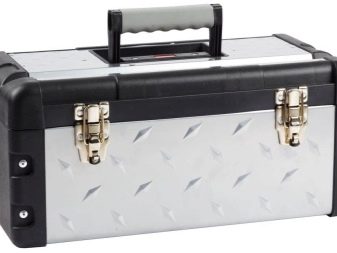

The photo shows different types of metal products.
- A folding metal box, structurally repeating products from the Soviet era.
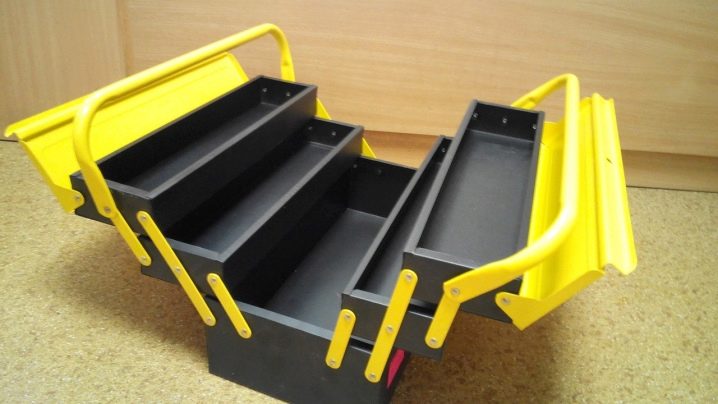
- Model Yato with drawers for small items.

- Zipower is a beautiful lightweight aluminum product with a convenient handle for transporting the tool.

- Spacious aluminum metal box with side handles. Designed for storage only, as there is no handle for long-term carrying.

- An elegant box with an unusual golden color.

Plastic
Plastic boxes are out of competition. They are lightweight, beautiful, multifunctional, presented in many models. Today they are made from particularly shock-resistant plastic. Unfortunately, in severe frost, it can be fragile and should be protected from mechanical stress. For use in winter, frost-resistant polypropylene products have been developed that respond well to temperature extremes.

The handles of plastic models are made non-slip, sometimes they are equipped with two at once - for horizontal and vertical carrying. The latches are endowed with latches. Such a box will not open even if it falls.
The designs are mainly multi-section, some are supplemented with transparent organizers for small fasteners. A plastic box can have a significant volume or be so small that it can fit into a regular backpack. The variety of plastic products is shown in the photographs:
- design with large comfortable handle has a spacious tool box and an upper organizer for hardware;

- box-trolley "Mega-Box" designed for professional equipment, convenient, roomy, but has a high cost;

- set for little things equipped with five sections.

- convenient sliding multi-section design;
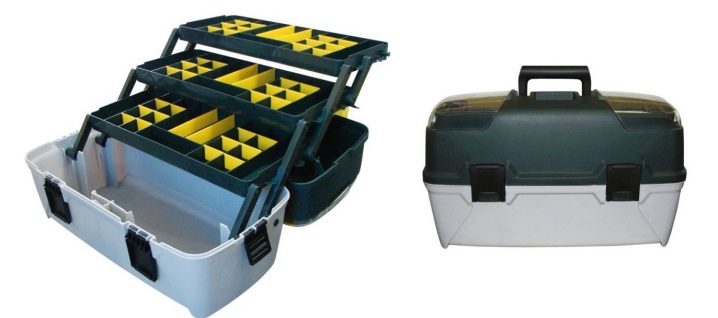
- lightweight stylish organizer with a transparent plastic cover.

Metal-plastic
The galvanized metal-plastic box is the perfect symbiosis of lightness and strength. Spacious structures are able to withstand loads to match metal products, but at the same time they are beautiful, modern and lightweight.
- The box has several deep sections and a small portable tray for small items.
- Boxing "Zubr" - lightweight, roomy, looks impressive and personable.


Rating of the best models
Having understood the types and materials of tool boxes, we propose to consider the models the best brands based on consumer reviews.
FMST1-71219 "FatMax Cantilever" Stanley 1-71-219
The box has a solid construction with waterproof seals and a reliable metal lock. The folding mechanism provides easy access to the tools. The box consists of three compartments, divided into smaller sections for convenience. Its dimensions are 45.6x31x23.5 cm.
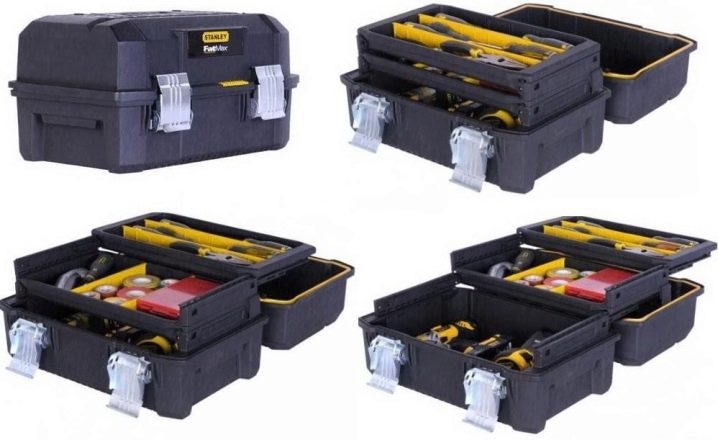
Tayg No. 600-E
The set of the polypropylene box includes a tray and organizer for hardware. The box is portable, designed for small-sized working tools and accessories. It has strong metal locks, a comfortable aluminum handle with ribs. Product dimensions are 60x30.5x29.5 cm, weight - 2.5 kg.

Magnusson
Box with wheels for Magnusson tools. The professional container has dimensions of 56.5x46.5x48.0 cm. It is endowed with two wheels and a telescopic handle, therefore it is intended not only for storage, but also for moving construction and repair tools.
The model is equipped with a removable basket, partitions and clamps.

Tough System DeWalt DWST1-75522
Box-module DS100 organizer for the Tough System DeWalt DWST1-75522. The organizer is a module of the "DeWalt Tough System 4 In 1" (mobile platform), has side clips that allow the drawers to be fastened together. Designed from highly durable plastic. Endowed with reliable metal locks and hinges. Product dimensions are 54.3x35x10 cm, weight - 4.7 kg.
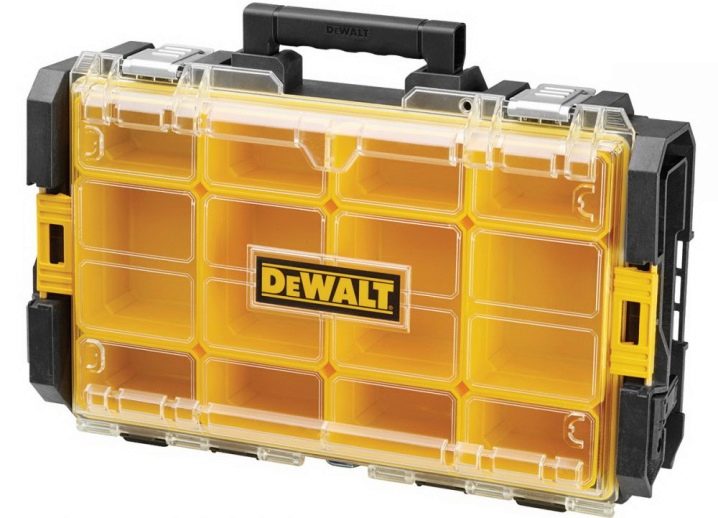
Makita Case 821551-8 MakPac 3
Universal box for storing medium-sized hand and power tools. Particularly durable plastic is not afraid of shocks, ultraviolet radiation and chemicals. The product has dimensions 39.5x29.5x21.0 cm.
The presence of a comfortable handle allows you to carry tools.
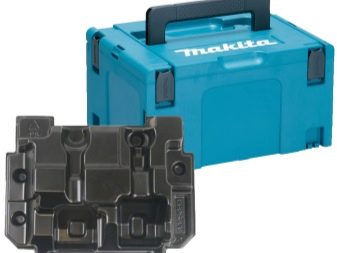

How to choose?
Choosing a box, the buyer usually already has an idea of its purpose: for professional activities or household needs. He should decide on the number of tools that the structure will contain, the choice of its dimensions depends on this. If there are not many tools, you can pay attention to the standard portable boxes. The buyer can choose vertical or horizontal models, a different number and arrangement of sections, the desired opening system.
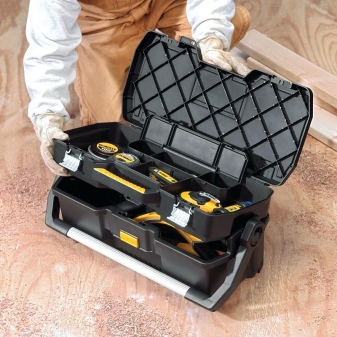

To work in your workshop and store a large number of tools, you can purchase a stationary and as large as possible box. If it is a large workshop or workshop area, where you have to carry out repair work in different parts of the room, it is better to purchase a large box on wheels or a trolley. Those living in a country house often make repairs outside the home workshop (in living quarters, a bathhouse, a summer kitchen, a veranda). In such cases, it is more convenient to use a modular set of boxes. Each module contains construction, locksmith power tools and is used as needed.

For large, heavy tools, metal boxes are suitable. If you are confused by the large weight, you can opt for the trolley. Knowing the number and size of your tool, it is more convenient to make a box for it yourself. It is easier to do this with pliable wood. When the idea of buying is fully formed, you can ask about brands and consumer reviews, compare prices.

Having chosen the desired model, you should pay attention to the following criteria:
- the bottom should be thick and have additional reinforcement, preferably without seams;
- walls are selected rigid, which do not deform when fully loaded with tools;
- a large box can be used more functionally if there is a small trolley in the kit;
- you can choose any deployment system, but the tool feed should be easy to access and clearly visible;
- it is convenient if the boxes are endowed with removable modules, they are easy to bring to the right place;
- for outdoor work in cold regions, you should choose frost-resistant plastic.

Tool boxes are good in all respects, thanks to them order is maintained in the workshop, any tool is in the shortest possible time, since it has its own specific place. In addition, the boxes can be transported and delivered to the direct workplace.
For information on how to choose a toolbox, see the next video.













The comment was sent successfully.